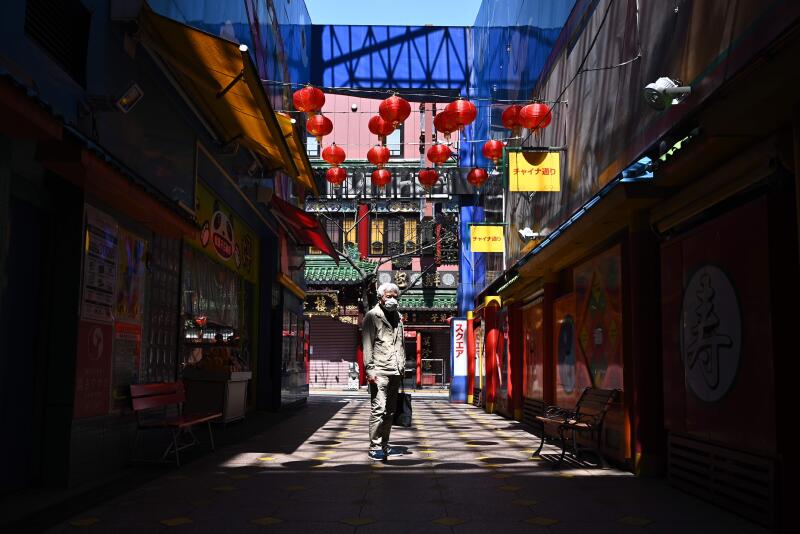Coronavirus: In Japan, national and local governments clash over emergency measures
Sign up now: Get insights on Asia's fast-moving developments

A man wearing a face mask stands in a lane in Yokohama's Chinatown, on April 9, 2020.
PHOTO: AFP
Follow topic:
TOKYO - While a state of emergency has been declared in Japan in seven prefectures, the national government is now locking horns with the affected local municipalities over what constitutes essential services and which businesses should close.
In another dispute, Aichi prefecture - where the industrial city of Nagoya is located - unilaterally declared its own state of emergency on Thursday (April 9) after it was shut out of the government's emergency declaration.
While there is no legal basis behind its own declaration, Aichi Governor Hideaki Omura hopes the announcement will invoke a sense of urgency and keep residents home.
Aichi has followed in the footsteps of Hokkaido, whose own unilateral three-week emergency declaration ending March 19 helped to slow the spread of the virus. Aichi now has Japan's fifth-most Covid-19 cases and second-highest number of deaths, but the national government did not think the rate of infection was fast enough to warrant inclusion.
All this hardly bodes well for the authorities, which have pledged to reduce confusion for the public in confusing times, and again epitomises Japan's rigidity and sclerotic bureaucracy.
On Tuesday, Prime Minister Shinzo Abe declared a state of emergency until May 6, covering the prefectures of Tokyo, Kanagawa, Chiba, Saitama, Osaka, Hyogo and Fukuoka. These areas are home to 56.1 million people, or 44.5 per cent of Japan's population.
The declaration, which does not carry criminal penalties, calls on the public to exercise self-restraint in going out unnecessarily. Local governments also can ask businesses to close and name and shame those that do not comply with requests, though they will not be charged.
Tokyo Governor Yuriko Koike had wanted wider closures beyond those envisioned by the central government.
While she has reportedly backed down on the plan to ask barber shops, home improvement stores and department stores to close, she is still likely to go further than the national government, which wants to keep some leisure facilities open.
"We do not have the luxury of taking our time to make a decision. I would like to go ahead with measures in line with the circumstances that we face," Ms Koike reportedly said at a closed-door meeting. She is set to announce Tokyo's measures on Friday.
This comes as the capital recorded 181 new cases on Thursday, in a daily high. Osaka also set a new daily record with 92 new cases. Nationwide, the number of cases has doubled in the span of one week to 5,448 cases as of 8pm, a tally by NHK showed.
But Mr Abe has an eye on the potential devastation on the economy, with predictions of up to a 25 per cent quarterly contraction.
His minister-in-charge of the Covid-19 response, Mr Yasutoshi Nishimura, had even told local governors to put off any request for businesses to shut by two weeks.
This was reportedly to gauge whether the emergency declaration, by itself, was enough to keep people off the streets and flatten the curve of infections.
But this appears counter-intuitive. If the public is by aand large expected to stay home, why is it business as usual for shop-owners and workers in non-essential services? And who are they meant to serve, if there are no customers?
Larger businesses with deeper pockets, including barbershop QB House, Toho Cinemas and Starbucks Japan, and department stores like Takashimaya and Isetan have all voluntarily shut at least in the seven prefectures.
But there are concerns that smaller mom-and-pop businesses will not survive the onslaught, despite a 108 trillion yen (S$1.4 trillion) stimulus pledge.
A report by the Teikoku Databank consultancy this week showed 40 companies, mainly in the service sector, have already declared bankruptcy due to the outbreak.
Local governors are asking the state to compensate businesses for losses due to closures.
But unlike countries like Britain, Japan does not intend to do so above a conditional payout of one million yen for independent businesses and two million yen for small-and-medium companies.
Its argument is that it would be too complex a system and would require too much time to create a legal framework, including defining what will constitute "lost revenues".
Yet this does not go far enough to protect livelihoods, some have argued.
"Just flaunting the financial volumes of the stimulus package does nothing to dispel public concerns," the Mainichi daily said in an editorial. "If the prime minister was aware of the gravity of the situation, he should have mapped out support schemes much earlier."
A poll by the newspaper showed that 72 per cent of respondents agreed with the state of emergency declaration, but 70 per cent felt it had come too late. Meanwhile, 77 per cent did not believe the state of emergency would be lifted on May 6 as planned.
In an address on Tuesday, Mr Abe asked the public to "voluntarily reduce human interaction by 70 to 80 per cent", without imposing a city-wide lockdown.
This appears to have had some impact. Ridership on the Tokyo Metro was down 60 per cent on Wednesday as compared to a year ago, while the loop JR Yamanote Line registered about a 35 per cent drop.
Data compiled by mobile service providers also estimated a 30 to 40 per cent drop in footfall in bustling areas like Shibuya, Shinjuku, Yokohama and Osaka.
When asked if more extensive measures were needed to raise these figures, Chief Cabinet Secretary Yoshihide Suga would only say: "The government asks for continued cooperation to reduce contact as far as possible."

